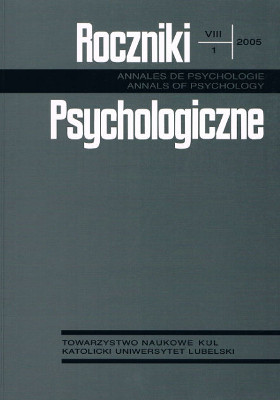Perceiving biases in one's own behaviour: Situational determinants
Abstract
Three independent studies verified the hypothesis that situational factors influence naive theories of one's own biases. The following situational factors were taken into account: authority level, reward, anxiety level, semantic or episodic memory. The accuracy of the perception of one's own biases was measured in all three studies. The results demonstrated that situational factors played a modest role in the accurate perception of one's own biases. The valence of biases showed the strongest impact on the accuracy of perception: higher accuracy was observed with respect to the biases that testify positively for the subject when compared to the biases that are negative.
References
Baddeley, A. (1998). Pamięć, poradnik użytkownika. Tłum. E. Kołodziej-Józefowicz. Warszawa: Prószyński i S-ka.
Blackman, M. C., Funder, D. (1998). The effect of information on consensus and accuracy in personality judgment. Journal of Experimental Social Psychology, 34, 164-181.
Brycz, H. (2003). Determinizm prawidłowości pychologicznych a trafność spostrzegania własnych i cudzych zachowań. Przegląd Psychologiczny, 46, 1, 57-78.
Brycz, H., Gulgowska, M. (1999). Wyznaczniki racjonalności w spostrzeganiu społecznym: rola atrybucyjnej perspektywy aktora i obserwatora w trafności spostrzegania prawidłowości psychologicznych i odchyleń od racjonalności w myśleniu potocznym. Przegląd Psychologiczny, 42, 3, 103-141.
Brycz, H., Kuryłek, J. (1999). Nabywanie umiejętności spostrzegania odchyleń od racjonalności we własnym zachowaniu. Forum Psychologiczne, 4, 1, 18-44.
Chen, S., Shechter, D., Chaiken, S. (1996). Getteing at the truth or getting along: Accuracy – versus impression-motivated heuristic and systematic processing. Journal of Personality and Social Psychology, 71, 262-275.
Cialdini, R. (1994). Wywieranie wpływu na ludzi. Gdańsk: GWP.
Cronbach, L. (1955). Processes affecting scores on „Understanding of Others” and assumed similarity. Psychological Bulletin, 52, 177-193.
Czapiński, J. (1988). Wartościowanie – efekt negatywności. Wrocław: Wydawnictwo PAN.
Czapiński, J. (1994). Psychologia szczęścia. Warszawa: Polskie Towarzystwo Psychologiczne.
Diekman, A. B., Eagly, A. H., Kulesa, P. (2002). Accuracy and bias in stereotypes about the social and political attitudes of women and men. Journal of Experimental Social Psychology, 38, 268-282.
Ditto, P. H., Lopez, D. F. (1992). Motivated scepticism: Use of differential decision criteria for preffered and nonpreffered conclusions. Journal of Personality and Social Psychology, 63, 586-584.
Heider, F. (1958). The psychology of interpersonal relationship. New York: Wiley.
Jarymowicz, M. (1994). Poza egocentryczną perspektywą widzenia siebie i świata. Warszawa: Wydawnictwo Instytutu Psychologii PAN.
Kahneman, D., Tversky, A. (1973). On the psychology of prediction. Psychological Review, 80, 273-251.
Kofta, M., Szustrowa, T. (red.) (2001, wyd. II). Złudzenia, które pozwalają żyć. Szkice z psychologii społecznej. Warszawa: PWN.
Kozielecki, J. (1975). Strategia psychologiczna. Warszawa: Nasza Księgarnia.
Kruger, J., Dunning, D. (1999). Unskilled and unaware of it: How difficulties of recognizing one's own incompetence lead to inflated self-assessments. Journal of Personality and Social Psychology, 77, 1121-1134.
Kruger, J., Gilovich, T. (1999). „Naive cynicism” in everyday theories of responsibility assessment: On biased assumptions of biases. Journal of Personality and Social Psychology, 76, 743-753.
Martin, L., Seta, J., Crelia, R. (1990). Assimilation and contrast as a function of people's willingness and ability to expend effort in forming an impression. Journal of Personality and Social Psychology, 59, 27-37.
Mądrzycki, T. (1986). Deformacje w spostrzeganiu. Warszawa: PWN.
Nisbett, R., Ross, L. (1980). Human inference: Strategies and shortcomings of social judgment. Englewood Cliffs, NJ: Prentice Hall.
Nosal, Cz. (2001). Psychologia myślenia i działania menadżera. Kraków: Akade.
Peeters, G. (1971). The positive-negative asymmetry: On cognitive consistency and positivity bias. European Journal of Social Psychology, 1, 4, 455-474.
Robinson, R., Keltner, D., Ward, A., Ross, L. (1995). Actual versus assumed differences in construal „naive realism” in intergroup perception and conflict. Journal of Personality and Social Psychology, 68, 404-417.
Sedikides, C., Herbst, K. C., Hardin, D. P., Dardis, G. (2002). Accountability as a detterent to self-enhancement: The search for mechanisms. Journal of Personality and Social Psychology, 83, 592-605.
Stapel, D. A., Koomen, W., Zeelenberg, M. (1998). The impact of accuracy motivation on interpretation, comparision, and correction processes. Accuracy x knowledge x accessibility effects. Journal of Personality and Social Psychology, 74, 878-893.
Tetlock, P. E. (1992). The impact of accountability on judgment and choice: Toward a social contingency model. Advances in Experimental Social Psychology, 25, 331-376.
Tyszka, T. (1999). Psychologiczne pułapki oceniania i podejmowania decyzji. Gdańsk: GWP.
Weary, G., Jacobson, J. (1997). Causal uncertainty beliefs and diagnostic information seeking. Journal of Personality and Social Psychology, 73, 839-848.
Wegener, D. T., Petty, R. E. (1995). Flexible correction processes in social judgment: The role of naive theories in corrections for perceived bias. Journal of Personality and Social Psychology, 68, 36-51.
Wojciszke, B. (2002). Człowiek wśród ludzi. Zarys psychologii społecznej (t. 8). Warszawa: Scholar.
Copyright (c) 2005 Roczniki Psychologiczne

This work is licensed under a Creative Commons Attribution-NonCommercial-NoDerivatives 4.0 International License.


